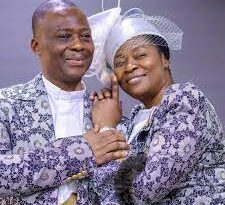Way of Maturity and Love: Choosing Forgiveness Over Hate
 Way of Maturity and Love: Choosing Forgiveness Over Hate
Way of Maturity and Love: Choosing Forgiveness Over Hate
“Love conquers all.” The words, often repeated in faith circles, carry new weight when spoken by someone who has faced suffering.
Archbishop Jacques Mourad of the Syrian Catholic Church in Homs knows this truth well. Abducted by ISIL militants in 2015, he was held captive for months alongside other Assyrian Christians in northeast Syria.
Reflecting on his ordeal, the Archbishop said love and forgiveness must remain central to Christian life even in persecution. “A believer cannot harbor hatred,” he said. “Forgiveness and mercy are the foundation of our faith.” His message to young people was simple but profound: hold fast to moral and spiritual values, no matter the circumstances.
Faith Tested by Violence
The Archbishop’s words resonate far beyond Syria. In Nigeria, ongoing violence has torn through communities of faith.
In Katsina State, dozens of worshippers were killed during morning prayers in August when gunmen stormed a mosque in Unguwan Mantau village. Authorities described the assault as a reprisal attack, one of many in a wave of sectarian and criminal violence that has plagued northern Nigeria.
Similar tragedies have unfolded across the Sahel, where groups linked to ISIL and al-Qaeda have turned places of worship into targets. In Niger, 44 people were killed in March when militants attacked the Fambita Mosque during Ramadan prayers. The UN Deputy Secretary-General, Amina Mohammed, has described the region as “ground zero” for one of the world’s worst security crises.
Human rights organizations, including Amnesty International, warn that violence against Christians in Nigeria has reached alarming levels. Thousands have been killed, and millions displaced from their homes in states such as Benue, Plateau, Taraba, and Kaduna.
ALSO READ: How the Church Can Lead the AI Revolution
A Call for Dialogue and Healing
Experts say rebuilding peace will require more than politics it demands genuine interfaith dialogue.
Professor Michalis Marioras of the University of Athens, speaking at a World Council of Churches meeting, urged faith leaders to move “from words to action.” True dialogue, he said, must reach ordinary people, not remain confined to academics and clergy. “We need fewer words and more deeds,” he stressed.
Nigeria once had a framework for this. The Advisory Council on Religious Affairs, created under General Ibrahim Babangida in 1986, aimed to promote interfaith understanding after tensions over the country’s membership in the Organization of Islamic Cooperation (OIC). Similarly, the Nigeria Inter-Religious Council (NIREC) brought together Christian and Muslim leaders to foster peace.
Reactivating such initiatives could help the nation heal not only from violence, but from mutual suspicion.
The Power of True Love
At the heart of these crises lies a timeless truth: love and hate cannot coexist.
Whether in Syria, India, or Nigeria, violence in the name of religion contradicts the very essence of faith. “Evil is alien to the Creator,” the article reminds us. “He who kills in the name of religion does so for his own cause, not God’s.”
True maturity, the piece argues, lies in understanding that divine justice does not require human violence. Love, mercy, and forgiveness are not signs of weakness they are the strength that holds humanity together.
As light overcomes darkness, so too must compassion overcome vengeance. And in a world still torn by division, that remains both the greatest challenge and the greatest hope.
Content Credit: Moyosola Oni
Image Credit: Google. Com




